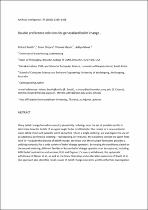JavaScript is disabled for your browser. Some features of this site may not work without it.
- ResearchSpace
- →
- Research Publications/Outputs
- →
- Journal Articles
- →
- View Item
| dc.contributor.author |
Booth, R

|
|
| dc.contributor.author |
Chopra, S

|
|
| dc.contributor.author |
Meyer, T

|
|
| dc.contributor.author |
Ghose, A

|
|
| dc.date.accessioned | 2012-03-23T08:23:04Z | |
| dc.date.available | 2012-03-23T08:23:04Z | |
| dc.date.issued | 2010-11 | |
| dc.identifier.citation | Booth, R, Chopra, S, Meyer, T and Ghose, A. 2010. Double preference relations for generalised belief change. Artificial Intelligence, vol. 174(16-17), pp 1339-1368 | en_US |
| dc.identifier.issn | 0004-3702 | |
| dc.identifier.uri | http://www.sciencedirect.com/science?_ob=ArticleURL&_udi=B6TYF-50RVNPB-1&_user=958262&_coverDate=11%2F30%2F2010&_rdoc=1&_fmt=high&_orig=gateway&_origin=gateway&_sort=d&_docanchor=&view=c&_searchStrId=1682244470&_rerunOrigin=scholar.google&_acct=C000049363&_version=1&_urlVersion=0&_userid=958262&md5=59de3376870fe87e979971f82c17bc38&searchtype=a | |
| dc.identifier.uri | http://ac.els-cdn.com/S0004370210001396/1-s2.0-S0004370210001396-main.pdf?_tid=9ee186fd6939f3b181f746d46a1789df&acdnat=1332488005_9bf652b99d9a36f3cc8d1eb00a555bcb | |
| dc.identifier.uri | http://hdl.handle.net/10204/5671 | |
| dc.description | Copyright: 2010 Elsevier. This is an ABSTRACT ONLY. | en_US |
| dc.description.abstract | Many belief change formalisms employ plausibility orderings over the set of possible worlds to determine how the beliefs of an agent ought to be modified after the receipt of a new epistemic input. While most such possible world semantics rely on a single ordering, we investigate the use of an additional preference ordering—representing, for instance, the epistemic context the agent finds itself in—to guide the process of belief change. We show that the resultant formalism provides a unifying semantics for a wide variety of belief change operators. By varying the conditions placed on the second ordering, different families of known belief change operators can be captured, including AGM belief contraction and revision, Rott and Pagnucco’s severe withdrawal, the systematic withdrawal of Meyer et al., as well as the linear liberation and s-liberation operators of Booth et al. Our approach also identifies novel classes of belief change operators worthy of further investigation. | en_US |
| dc.language.iso | en | en_US |
| dc.publisher | Elsevier | en_US |
| dc.relation.ispartofseries | Workflow;6003 | |
| dc.subject | Belief revision | en_US |
| dc.subject | Belief removal | en_US |
| dc.subject | Belief liberation | en_US |
| dc.subject | Severe withdrawal | en_US |
| dc.title | Double preference relations for generalised belief change | en_US |
| dc.type | Article | en_US |
| dc.identifier.apacitation | Booth, R., Chopra, S., Meyer, T., & Ghose, A. (2010). Double preference relations for generalised belief change. http://hdl.handle.net/10204/5671 | en_ZA |
| dc.identifier.chicagocitation | Booth, R, S Chopra, T Meyer, and A Ghose "Double preference relations for generalised belief change." (2010) http://hdl.handle.net/10204/5671 | en_ZA |
| dc.identifier.vancouvercitation | Booth R, Chopra S, Meyer T, Ghose A. Double preference relations for generalised belief change. 2010; http://hdl.handle.net/10204/5671. | en_ZA |
| dc.identifier.ris | TY - Article AU - Booth, R AU - Chopra, S AU - Meyer, T AU - Ghose, A AB - Many belief change formalisms employ plausibility orderings over the set of possible worlds to determine how the beliefs of an agent ought to be modified after the receipt of a new epistemic input. While most such possible world semantics rely on a single ordering, we investigate the use of an additional preference ordering—representing, for instance, the epistemic context the agent finds itself in—to guide the process of belief change. We show that the resultant formalism provides a unifying semantics for a wide variety of belief change operators. By varying the conditions placed on the second ordering, different families of known belief change operators can be captured, including AGM belief contraction and revision, Rott and Pagnucco’s severe withdrawal, the systematic withdrawal of Meyer et al., as well as the linear liberation and s-liberation operators of Booth et al. Our approach also identifies novel classes of belief change operators worthy of further investigation. DA - 2010-11 DB - ResearchSpace DP - CSIR KW - Belief revision KW - Belief removal KW - Belief liberation KW - Severe withdrawal LK - https://researchspace.csir.co.za PY - 2010 SM - 0004-3702 T1 - Double preference relations for generalised belief change TI - Double preference relations for generalised belief change UR - http://hdl.handle.net/10204/5671 ER - | en_ZA |






